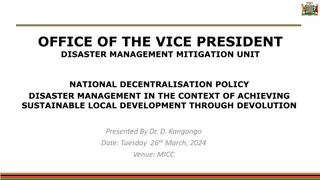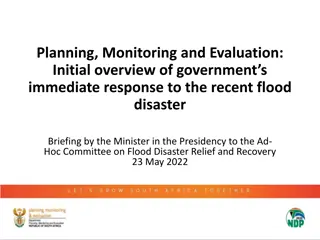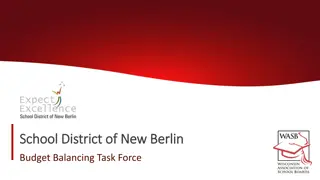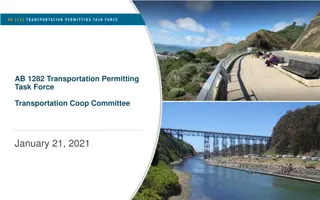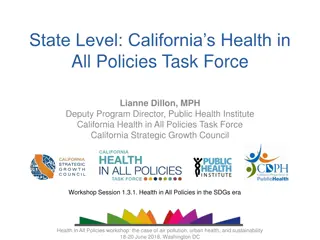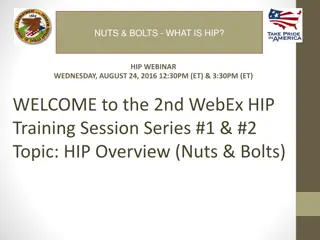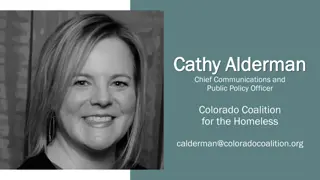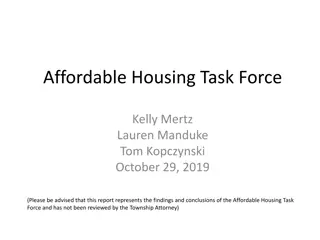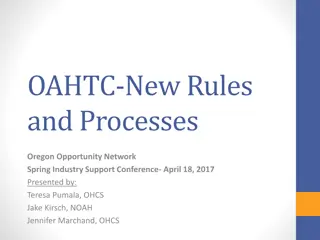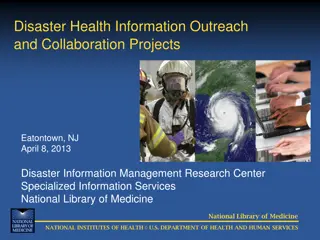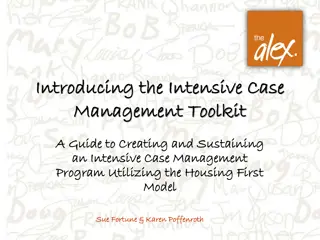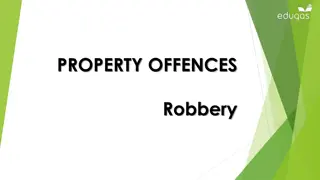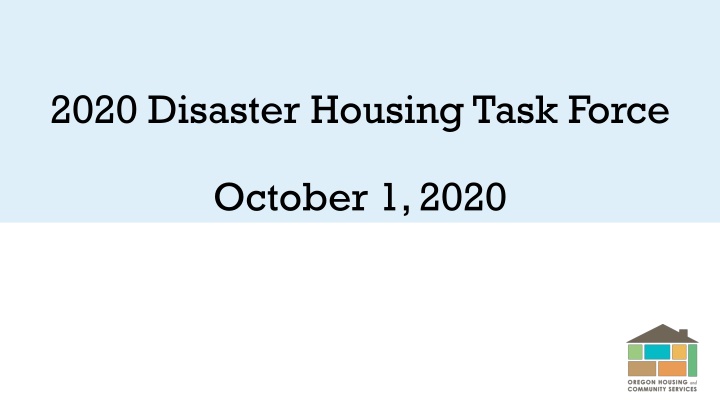
Oregon Disaster Housing Task Force Updates
Briefing on the Oregon Disaster Housing Task Force's efforts in coordinating regional wildfire economic recovery teams and providing resources for advancing regional recovery. Updates from key officials and subject matter experts on damage assessment, FEMA updates, obtaining insurance tips, and manufactured home ownership documents.
Download Presentation

Please find below an Image/Link to download the presentation.
The content on the website is provided AS IS for your information and personal use only. It may not be sold, licensed, or shared on other websites without obtaining consent from the author. If you encounter any issues during the download, it is possible that the publisher has removed the file from their server.
You are allowed to download the files provided on this website for personal or commercial use, subject to the condition that they are used lawfully. All files are the property of their respective owners.
The content on the website is provided AS IS for your information and personal use only. It may not be sold, licensed, or shared on other websites without obtaining consent from the author.
E N D
Presentation Transcript
2020 Disaster Housing Task Force October 1, 2020
Oregon Housing and Community Services Kenny LaPoint, Director of Public Affairs Oregon Office of Emergency Management Briefing Stan Thomas and Joseph Murray ODHTF Chair Membership and Subject Matter Expertise updates Regional Wildfire Economic Recovery Teams coordinated with Regional Solutions ODHTF supporting Regional Wildfire Economic Recovery Teams through resources, information sharing, advocacy and other tools that help to advance regional recovery efforts
Task Force and Subject Matter Experts Oregon Housing Disaster Task Force Regional Wildfire Economic Recovery Teams Subject Matter Experts
Oregon Office of Emergency Management Briefing Stan Thomas and Joseph Murray Oregon Office of Emergency Management Briefing Stan Thomas and Joseph Murray Situational Update Damage Assessment
FEMA Updates Anita Jeanette (AJ) and Sarah Mahlik
Manufactured Homes Lost to Wildfire: Obtaining documents and insurance tips September 30, 2020
Manufactured home ownership documents https://aca-oregon.accela.com/OR_MHODS/ Download, print, or email Step-by-step instructions
Contact us Building Codes Division Department of Consumer and Business Services Warren Jackson Field/Statewide Services Manager 503-373-7755 Cell: 503-949-3516 warren.d.jackson@oregon.gov
Manufactured Home Insurance Many manufactured homes insurance policies based on actual cash value Total loss settlement either: Policy limits Current sales price of similar home based on year, make, and model Policy may have contents coverage for personal belongings and additional living expenses
Claims process rights You should not be rushed or pressured You have the right to: oSee the full evaluation oSee the bid oGet comparable information oTake your time If pressured to settle, file a complaint at dfr.oregon.gov; call 888-877-4894 (toll-free)
Contact Us Division of Financial Regulation Department of Consumer and Business Services dfr.oregon.gov 888-877-4894 (toll free) dfr.InsuranceHelp@oregon.gov dfr.FinancialServicesHelp@Oregon.gov
DISASTER RESOURCES U.S. DEPARTMENT OF HOUSING AND URBAN DEVELOPMENT PORTLAND FIELD OFFICE TONY RAMIREZ FIELD OFFICE DIRECTOR 12
Housing Choice Vouchers (HCV) and porting Public Housing Authority disaster preference RESOURCES FOR INDIVIDUALS HOME Investment Partnership Program Inventory of HUD vacancies and accessible units Continuums of Care (CoC) 13
HOUSING CHOICE VOUCHERS (HCV) AND PORTING Families that have been impacted can request to port their HCV to another Public Housing Authority (PHA), both within the state or to another state. Families who do not currently have a HCV but who otherwise meet the eligibility requirements may be given preference for a HCV from a PHA with a disaster preference (see next slide for a list of PHAs with preference). Typically, HCV recipients must live within their PHAs jurisdiction for one year before they are eligible to port, but in disaster circumstances that requirement can be waived per the PHA. To apply, contact the local PHA. 14
PUBLIC HOUSING AUTHORITY DISASTER PREFERENCE A PHA can use its own existing available vouchers or public housing units to assist either displaced public housing or voucher participants affected by the disaster. PHAs with a voucher or public housing program are encouraged to adopt an admission preference for displaced residents and program participants. PHAs may provide for an admission preference for disaster-impacted families that are not currently receiving assistance and are income eligible. For the Public Housing Program, all applicants must be informed about the availability of the preference and given an opportunity to qualify. The HCV Program does not have the same regulatory requirement. Currently, the following Housing Authorities are offering preference for disaster victims: West Valley Housing Authority (Polk County), Housing Authority of Malheur and Harney Counties, Josephine Housing and Community Development, Homes for Good (Lane County), and Marion County Housing Authority. 16 Housing Authorities have not yet responded. 15
HOME INVESTMENT PARTNERSHIP PROGRAM Formula grants to States and localities that communities use - often in partnership with local nonprofit groups for building, buying, and/or rehabilitating affordable housing for rent or homeownership or providing direct rental assistance to low-income people. Flexibility allows States and local governments to use funds for grants, direct loans, loan guarantees or other forms of credit enhancements, rental assistance, or security deposits. Eligible Activities - Home purchase or rehabilitation financing assistance, build or rehabilitate housing for rent or ownership; tenant-based rental assistance contracts of up to 2 years. Eligible Recipients - For rental housing/assistance, at least 90% of families must have incomes that are no more than 60% AMI. In rental projects with five or more assisted units, at least 20% of the units must be occupied by families with incomes that do not exceed 50% AMI. Households receiving HUD assistance must not exceed 80% AMI. 16
HOME INVESTMENT MAJOR DISASTER DECLARED COUNTIES HOME Participating Jurisdictions: Clackamas FY20 Funding: $1,045,044 Oregon Nonentitlement (Douglas, Jackson, Lane, Lincoln, Linn, Marion) FY20 Funding: $9,520,455
INVENTORY OF HUD VACANCIES AND ACCESSIBLE UNITS HUD Resource Locator has GIS maps of HUD-assisted and USDA RD housing in Oregon based on type, along with contact information. HUD Portland Field Office is compiling lists of available units across the state and in WA, ID, and CA for families that have been impacted. HUD Portland Field Office is collecting information on accessible units across the state, including unit size. Once we receive information on impacted families, we will begin assisting them with finding housing, starting with HUD-assisted families. 18
CONTINUUMS OF CARE (COC) The Continuum of Care (CoC) Homeless Assistance Program assists individuals and families experiencing homelessness by helping homeless individuals and families move into transitional and permanent housing. In order to qualify for this program applicants must be homeless or at risk of losing housing. To apply, contact the local administering agency. CoCs can also help people connect with many other resources in their local area. This may be an especially helpful resource for people who are currently staying in Red Cross Shelters who may have been houseless before the disaster. 19
Community Development Block Grant (CDBG) State and Entitlement RESOURCES FOR COMMUNITIES Section 108 Loan Guarantee Program Tribal Resources Community Development Block Grant Disaster Recovery (CDBG-DR) 20
COMMUNITY DEVELOPMENT BLOCK GRANT STATE AND ENTITLEMENT The CDBG Entitlement Program provides annual grants on a formula basis to entitled cities and counties to develop viable urban communities by providing decent housing and a suitable living environment, and by expanding economic opportunities, principally for low- and moderate-income persons. Under the State CDBG Program, states award grants to smaller units of general local government that develop and preserve decent affordable housing, to provide services to the most vulnerable in our communities, and to create and retain jobs. Annually, each State develops funding priorities and criteria for selecting projects. Each State administers CDBG funds for non-entitlement areas. Non-entitlement areas include those units of general local government which do not receive CDBG funds directly from HUD. Non-entitlement areas are cities with populations of less than 50,000 (except cities that are designated principal cities of Metropolitan Statistical Areas), and counties with populations of less than 200,000. 21
CDBG FUNDING MAJOR DISASTER DECLARED COUNTIES CDBG State and Entitlement Funding: Clackamas FY20 Funding: $2,258,706 Oregon Nonentitlement (Douglas, Jackson, Lane, Lincoln, Linn, Marion*) FY20 Funding: $13,623,873 * Marion County will receive its own CDBG allocation as a new Urban County in FY21.
SECTION 108 LOAN GUARANTEE PROGRAM Provides CDBG recipients with the ability to leverage their annual grant allocation to access low-cost, flexible financing for economic development, housing, public facility, and infrastructure projects. Communities can use Section 108 guaranteed loans to either finance specific projects or to launch loan funds to finance multiple projects over several years. Flexible repayment terms also make it ideal for layering with other sources of community and economic development financing including, but not limited to, New Markets Tax Credits (NMTC), Low Income Housing Tax Credits (LIHTC), and Opportunity Zone equity investments. 23
SECTION 108 BORROWING AUTHORITY Major disaster declared counties available borrowing authority as of March 2020: Clackamas $193,530 Oregon Nonentitlement (Douglas, Jackson, Lane, Lincoln, Linn, Marion $68,119.365
TRIBAL RESOURCES Indian Housing Block Grant (IHBG) IHBG is a formula grant that provides a range of affordable housing activities on Indian reservations and Indian areas for activities including housing development, assistance to housing developed under the Indian Housing Program, housing services to eligible families and individuals, crime prevention and safety, and activities that provide creative approaches to solving affordable housing problems. IHBG entitlement funding can be re-prioritized/re-programmed to meet disaster needs. Imminent Threat Grant Projects address issues that have an immediate negative impact on public health or safety of tribal residents. Funds are awarded on a first-come first-serve basis until the amount set aside for this purpose is expended. The request must be submitted to the Area ONAP for your region (NWONAP). 25
COMMUNITY DEVELOPMENT BLOCK GRANT DISASTER RECOVERY (CDBG-DR) Congress may appropriate additional funding for the CDBG Program as Disaster Recovery grants to rebuild the affected areas and provide crucial seed money to start the recovery process. Flexible grants to help cities, counties, and States recover from Presidentially declared disasters, especially in low-income areas, subject to availability of supplemental appropriations.Not all disasters receive DR appropriations. Since CDBG Disaster Recovery (CDBG-DR) assistance may fund a broad range of recovery activities, HUD can help communities and neighborhoods that otherwise might not recover due to limited resources. CDBG-DR could be used to payback Section 108 loans IF language is included in the disaster appropriation. 26
Tony Ramirez, Portland Field Office Director Tony.Ramirez@hud.gov Vanessa Krueger, Senior Management Analyst Vanessa.J.Krueger@hud.gov CONTACT INFORMATION Ann Gravier, Senior Management Analyst HUD Mission Assigned Ann.Y.Gravier@hud.gov HUD Portland Field Office Phone Number: 971-222-2600 27
Regular Scheduled Taskforce Meetings The Task Force will routinely meet, share and distribute information, and assure new Task Force representatives are familiar with its work and its membership. The Task Force will convene frequently to identify: o Anticipated housing needs of individuals and families affected o Resources available to address anticipated identified needs o Potential shortfalls in available housing or resources o Solutions to fill the shortfalls Meetings are currently scheduled biweekly on Thursdays at 2:30. The next meeting will take place October 15.
Resources: Encourage Oregonians to register with FEMA to access individual assistance. Every Oregonian who is eligible should receive the assistance they need. Let s spread the word. Contact: 800-621-3362, download the FEMA app or visit http://DisasterAssistance.gov Please continue to share the wildfire.oregon.gov website with your networks.
Contact Kenny LaPoint, Director, Public Affairs Oregon Housing & Community Services 503-986-6758| Kenny.LaPoint@Oregon.Gov


